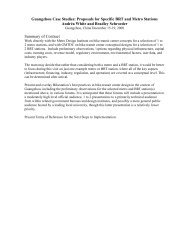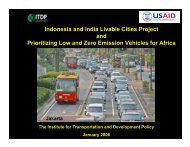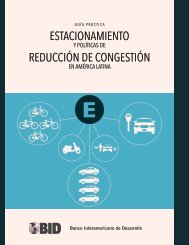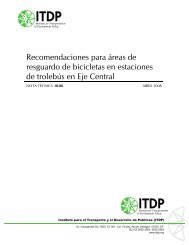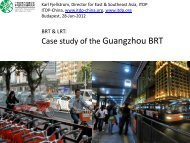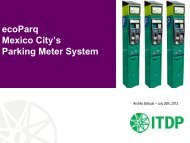Making TransJakarta a World Class BRT System - ITDP | Institute for ...
Making TransJakarta a World Class BRT System - ITDP | Institute for ...
Making TransJakarta a World Class BRT System - ITDP | Institute for ...
Create successful ePaper yourself
Turn your PDF publications into a flip-book with our unique Google optimized e-Paper software.
principal contract. The software to run the ticketing system had been designed by a<br />
different sub-contractor to Angelcom SA, a local subsidiary of a French IT company.<br />
Medina Inox hired a <strong>for</strong>mer staff member from Angelcom SA who brought with him<br />
some of the technical knowledge necessary to run the system, but not enough to adapt the<br />
system to Jakarta’s different ticketing system needs. Medina Inox is now being sued by<br />
Angelcom on the basis of theft of intellectual property rights.<br />
DisHub procured the contactless ‘smart cards’ from MIFARE, another local partner of<br />
Medina-Inox, again without a competitive bid.<br />
Upon the creation of BP <strong>TransJakarta</strong>, BP <strong>TransJakarta</strong> then contracted out <strong>for</strong> one year<br />
the operation of the ticketing system to a separate company, PT Lestari Abadi after a<br />
competitive bid between four pre-determined candidates, which were evaluated with<br />
<strong>TransJakarta</strong>’s own evaluation criteria. A full open tender was not held since time was<br />
very limited. PT Lestari Abadi operates as ticket sales and revenue collector operator<br />
only.<br />
DisHub was supposed to transfer the ticketing system equipment to <strong>TransJakarta</strong>, but<br />
because it never worked well, <strong>TransJakarta</strong> refused to take ownership of it.<br />
Since the opening of <strong>TransJakarta</strong>’s Bus Rapid Transit system in January of 2004, the<br />
ticketing system has not worked well. The following problems were the most serious:<br />
o Customers initially faced long delays waiting to purchase tickets and entering the<br />
gate barrier.<br />
o The turnstiles were frequently unable to read the smart cards due to electrical and<br />
mechanical failures.<br />
o The smart cards procured were sub-standard and many of them failed.<br />
o The amount of revenue collected was difficult <strong>for</strong> <strong>TransJakarta</strong> to track because<br />
the data was consolidated by DisHub, and this data was incomplete, and not sent<br />
in a secure <strong>for</strong>m to <strong>TransJakarta</strong>.<br />
o The system was not programmed in a way to handle early morning discounts or<br />
discounts from passengers transferring from feeder buses.<br />
o The system was not installed with proper grounding and power stabilization<br />
equipment.<br />
While many of the problems were technical, they were at root contractual and<br />
institutional problems. Some of the problems encountered could have been avoided had<br />
DisHub signed a better contract with the equipment manufacturer. The contract should<br />
have required the equipment provider to provide ongoing service, and part of the payment<br />
should have been withheld until after the system was operational. The contract should<br />
have included stiff penalties <strong>for</strong> failure. Nor did the contract guarantee the transfer of the<br />
secret keys necessary to allow a second party to reprogram the system. As a result, when<br />
problems arose, the ticketing equipment supplier tried to get additional resources out of<br />
DisHub be<strong>for</strong>e agreeing to fix the problem. We do not know the degree to which the<br />
Final Recommendations <strong>for</strong> <strong>TransJakarta</strong>, p. 43




